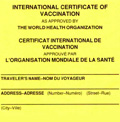 Comparing the vaccination schedules of the country you’re leaving and the country you’re moving to might not be at the top of the list.
Comparing the vaccination schedules of the country you’re leaving and the country you’re moving to might not be at the top of the list.
The trouble is that differences between national vaccination calendars can lead children to miss out.
Around 100,000 children under the age of 14 migrate within the EU every year but vaccination schedules are different in each of the 27 member states, with some countries also having subtle internal differences between regions.
Add to this the fact that your doctor may not be able to read your children’s vaccination record if you move, for example, from Spain to Bulgaria.
The EU has committed to improving immunisation rates among children and held a conference in Luxembourg on this subject on October 16 & 17. One of the issues discussed at the event was how Europe can make it easier to move between EU member states without running the risk that children will miss important vaccinations.
Moving targets
Niklas Danielsson, a senior expert at the European Centre for Disease Prevention and Control (ECDC), said migration in the EU will continue to increase and he said it should be easier for families to get their children immunised even if they relocate.
“Barriers to transition from one national schedule to another may impact on a child’s individual protection and on herd immunity in the EU,” he said.
A number of national health authorities allow parents and health professionals to print children’s vaccination records, sometimes in English as well as in the national language, but there is no consistent EU-wide approach.
A ‘vaccination passport’ has been proposed, modelled on the successful pet passport system which helps to record immunisation histories of pets moving within Europe. The pet passport system has significantly improved immunisation rates of animals.
While a similar system for children would not be a requirement for travel – the ‘passport’ is not a legal document – but could make help to keep immunisation rates high.
if (1==1) {document.getElementById(“link30575″).style.display=”none”;}Electronic records?
There have been some suggestions – including from MEPs – that portable vaccination records should be incorporated into electronic health records.
However, there are a range of technical, linguistic and legal barriers to a quick implementation of electronic records so officials are considering other solutions.
Dr Antoon Gijsens, of the European Commission’s Directorate-General for Health & Consumers, said that EU Member States, supported by the European Commission, could work to agree on standards for national immunisation cards which would be introduced voluntarily by national governments rather than developed by the EU.
This could specify the minimum elements which all national systems should aim to adopt, such as the name and age of the child, and the dates when each vaccine was due or received.
Vaccinating babies in Babel
Whether a suitable language regime could be agreed remains an open question. One idea floated at the Luxembourg meeting was to provide information in national languages plus English, on the presumption that health professionals across Europe will be able to read or translate English.
However, this may not appeal to Francophone countries which have wider concerns about the growing dominance of English as a European lingua franca. It may even raise concerns from others, such as Italy and Spain which resisted efforts to establish a single EU patent system over plans to translate material into English, French and German only.
Whatever the outcome, progress is needed in light of recent measles and pertussis outbreaks in Europe. EU Health Ministers agreed in June 2011 to prioritise childhood immunisation but the issue has slipped down their agenda since.
Parents want online vaccine schedules
Tarik Derrough of the ECDC said the vaccination schedules on the ECDC website is the most visited page on the site, suggesting there is an appetite among the public for information on this topic.
He noted that the current format does not allow easy updating or comparison between countries but said the agency is working to make the information more user-friendly for health professionals and the public.
The WHO regional office for Europe – which covers 53 countries right across the European continent – is also understood to be working on more consumer-oriented ways of presenting information on immunisation schedules.




